Mental Health Nursing: National Recovery Principles for Jeremy's Case
VerifiedAdded on 2020/04/07
|8
|2532
|357
Essay
AI Summary
This essay delves into the principles of recovery-oriented mental health nursing, using the case of Jeremy, a person with schizophrenia, as a focal point. It examines the national recovery principles and framework, highlighting how these principles were applied in Jeremy's journey from being a top singer to experiencing symptoms of schizophrenia and eventually returning to the stage. The essay discusses the significance of a holistic approach, emphasizing informed treatment, medical therapy, rehabilitation, and psychological support. It emphasizes the crucial role of healthcare professionals in fostering hope, respecting individual choices, and promoting social inclusion, while also considering the impact of internal and external factors on the recovery process. The essay underscores the importance of partnership, clear communication, and a positive attitude in achieving recovery, as well as the need to address stigma and discrimination associated with mental illness. References from several publications are provided to support the arguments and concepts discussed in this essay.
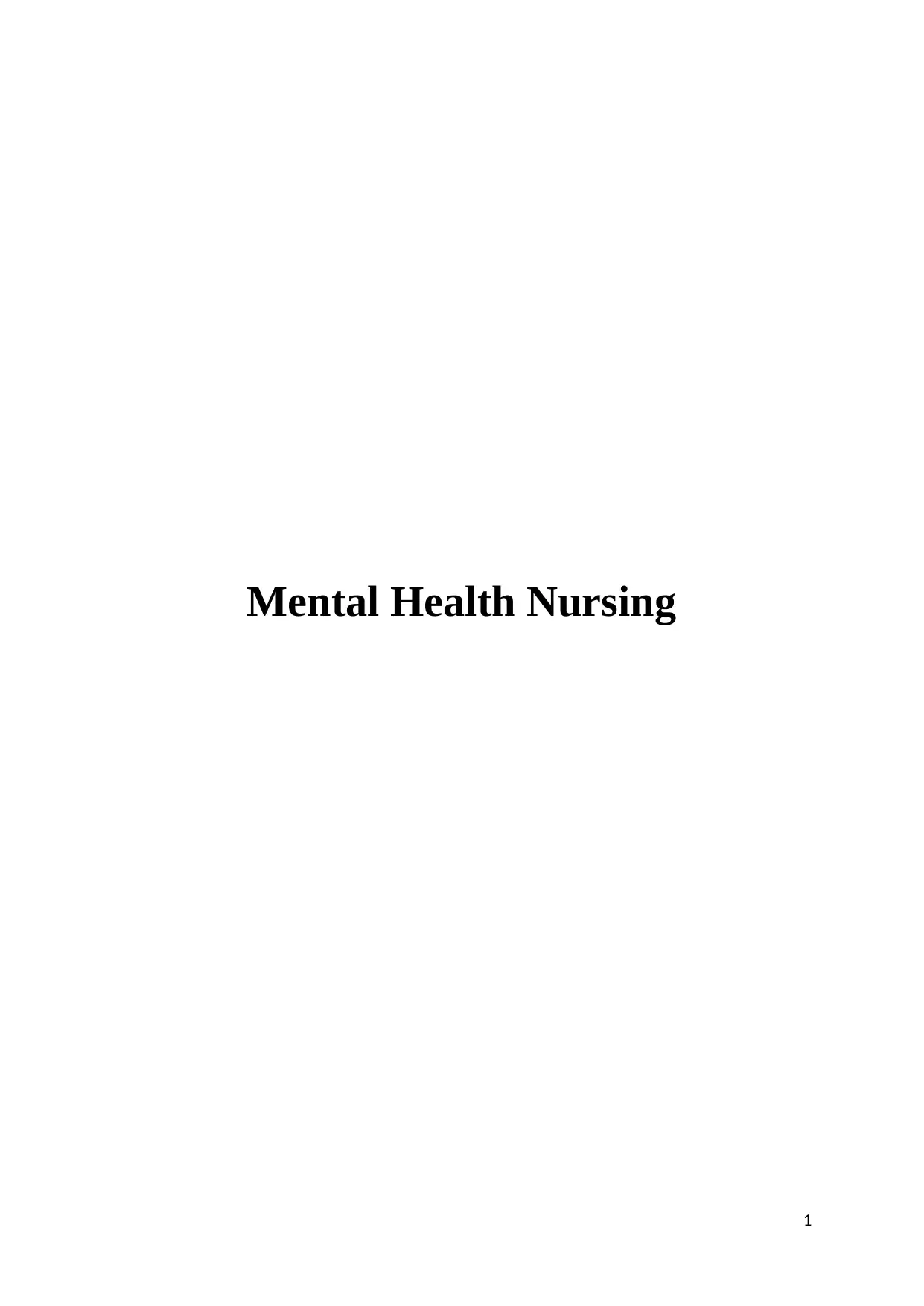
Mental Health Nursing
1
1
Paraphrase This Document
Need a fresh take? Get an instant paraphrase of this document with our AI Paraphraser
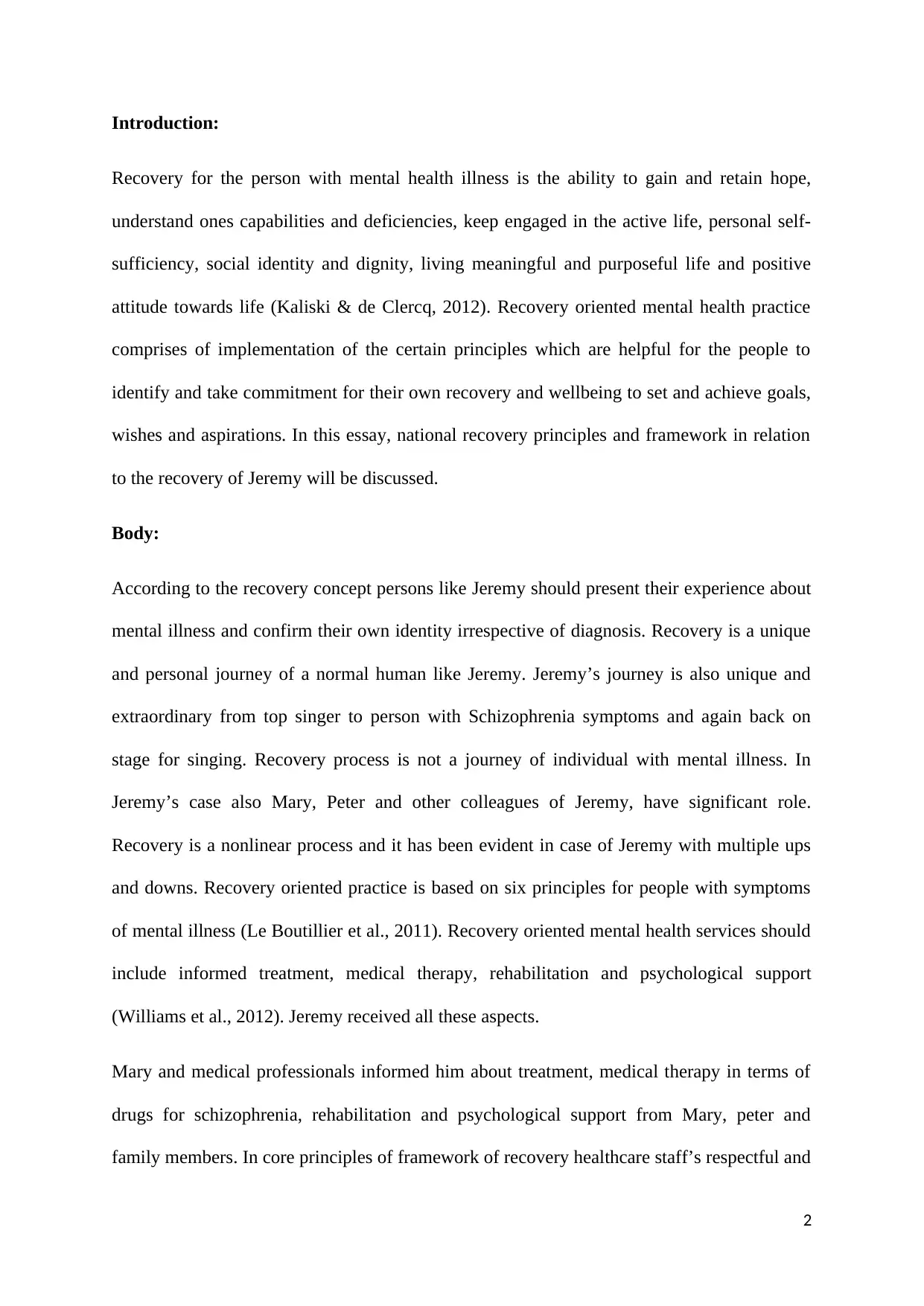
Introduction:
Recovery for the person with mental health illness is the ability to gain and retain hope,
understand ones capabilities and deficiencies, keep engaged in the active life, personal self-
sufficiency, social identity and dignity, living meaningful and purposeful life and positive
attitude towards life (Kaliski & de Clercq, 2012). Recovery oriented mental health practice
comprises of implementation of the certain principles which are helpful for the people to
identify and take commitment for their own recovery and wellbeing to set and achieve goals,
wishes and aspirations. In this essay, national recovery principles and framework in relation
to the recovery of Jeremy will be discussed.
Body:
According to the recovery concept persons like Jeremy should present their experience about
mental illness and confirm their own identity irrespective of diagnosis. Recovery is a unique
and personal journey of a normal human like Jeremy. Jeremy’s journey is also unique and
extraordinary from top singer to person with Schizophrenia symptoms and again back on
stage for singing. Recovery process is not a journey of individual with mental illness. In
Jeremy’s case also Mary, Peter and other colleagues of Jeremy, have significant role.
Recovery is a nonlinear process and it has been evident in case of Jeremy with multiple ups
and downs. Recovery oriented practice is based on six principles for people with symptoms
of mental illness (Le Boutillier et al., 2011). Recovery oriented mental health services should
include informed treatment, medical therapy, rehabilitation and psychological support
(Williams et al., 2012). Jeremy received all these aspects.
Mary and medical professionals informed him about treatment, medical therapy in terms of
drugs for schizophrenia, rehabilitation and psychological support from Mary, peter and
family members. In core principles of framework of recovery healthcare staff’s respectful and
2
Recovery for the person with mental health illness is the ability to gain and retain hope,
understand ones capabilities and deficiencies, keep engaged in the active life, personal self-
sufficiency, social identity and dignity, living meaningful and purposeful life and positive
attitude towards life (Kaliski & de Clercq, 2012). Recovery oriented mental health practice
comprises of implementation of the certain principles which are helpful for the people to
identify and take commitment for their own recovery and wellbeing to set and achieve goals,
wishes and aspirations. In this essay, national recovery principles and framework in relation
to the recovery of Jeremy will be discussed.
Body:
According to the recovery concept persons like Jeremy should present their experience about
mental illness and confirm their own identity irrespective of diagnosis. Recovery is a unique
and personal journey of a normal human like Jeremy. Jeremy’s journey is also unique and
extraordinary from top singer to person with Schizophrenia symptoms and again back on
stage for singing. Recovery process is not a journey of individual with mental illness. In
Jeremy’s case also Mary, Peter and other colleagues of Jeremy, have significant role.
Recovery is a nonlinear process and it has been evident in case of Jeremy with multiple ups
and downs. Recovery oriented practice is based on six principles for people with symptoms
of mental illness (Le Boutillier et al., 2011). Recovery oriented mental health services should
include informed treatment, medical therapy, rehabilitation and psychological support
(Williams et al., 2012). Jeremy received all these aspects.
Mary and medical professionals informed him about treatment, medical therapy in terms of
drugs for schizophrenia, rehabilitation and psychological support from Mary, peter and
family members. In core principles of framework of recovery healthcare staff’s respectful and
2
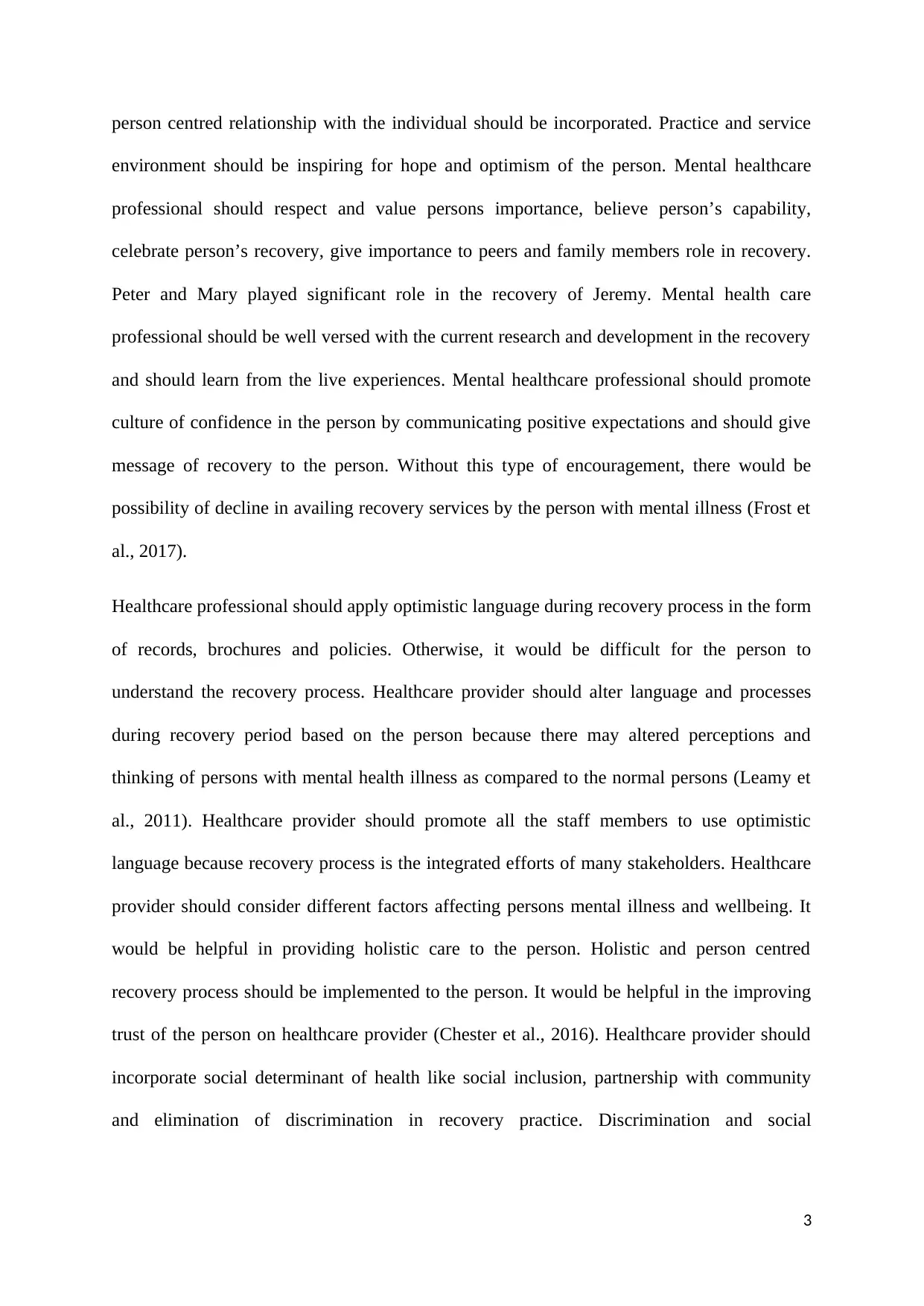
person centred relationship with the individual should be incorporated. Practice and service
environment should be inspiring for hope and optimism of the person. Mental healthcare
professional should respect and value persons importance, believe person’s capability,
celebrate person’s recovery, give importance to peers and family members role in recovery.
Peter and Mary played significant role in the recovery of Jeremy. Mental health care
professional should be well versed with the current research and development in the recovery
and should learn from the live experiences. Mental healthcare professional should promote
culture of confidence in the person by communicating positive expectations and should give
message of recovery to the person. Without this type of encouragement, there would be
possibility of decline in availing recovery services by the person with mental illness (Frost et
al., 2017).
Healthcare professional should apply optimistic language during recovery process in the form
of records, brochures and policies. Otherwise, it would be difficult for the person to
understand the recovery process. Healthcare provider should alter language and processes
during recovery period based on the person because there may altered perceptions and
thinking of persons with mental health illness as compared to the normal persons (Leamy et
al., 2011). Healthcare provider should promote all the staff members to use optimistic
language because recovery process is the integrated efforts of many stakeholders. Healthcare
provider should consider different factors affecting persons mental illness and wellbeing. It
would be helpful in providing holistic care to the person. Holistic and person centred
recovery process should be implemented to the person. It would be helpful in the improving
trust of the person on healthcare provider (Chester et al., 2016). Healthcare provider should
incorporate social determinant of health like social inclusion, partnership with community
and elimination of discrimination in recovery practice. Discrimination and social
3
environment should be inspiring for hope and optimism of the person. Mental healthcare
professional should respect and value persons importance, believe person’s capability,
celebrate person’s recovery, give importance to peers and family members role in recovery.
Peter and Mary played significant role in the recovery of Jeremy. Mental health care
professional should be well versed with the current research and development in the recovery
and should learn from the live experiences. Mental healthcare professional should promote
culture of confidence in the person by communicating positive expectations and should give
message of recovery to the person. Without this type of encouragement, there would be
possibility of decline in availing recovery services by the person with mental illness (Frost et
al., 2017).
Healthcare professional should apply optimistic language during recovery process in the form
of records, brochures and policies. Otherwise, it would be difficult for the person to
understand the recovery process. Healthcare provider should alter language and processes
during recovery period based on the person because there may altered perceptions and
thinking of persons with mental health illness as compared to the normal persons (Leamy et
al., 2011). Healthcare provider should promote all the staff members to use optimistic
language because recovery process is the integrated efforts of many stakeholders. Healthcare
provider should consider different factors affecting persons mental illness and wellbeing. It
would be helpful in providing holistic care to the person. Holistic and person centred
recovery process should be implemented to the person. It would be helpful in the improving
trust of the person on healthcare provider (Chester et al., 2016). Healthcare provider should
incorporate social determinant of health like social inclusion, partnership with community
and elimination of discrimination in recovery practice. Discrimination and social
3
⊘ This is a preview!⊘
Do you want full access?
Subscribe today to unlock all pages.

Trusted by 1+ million students worldwide
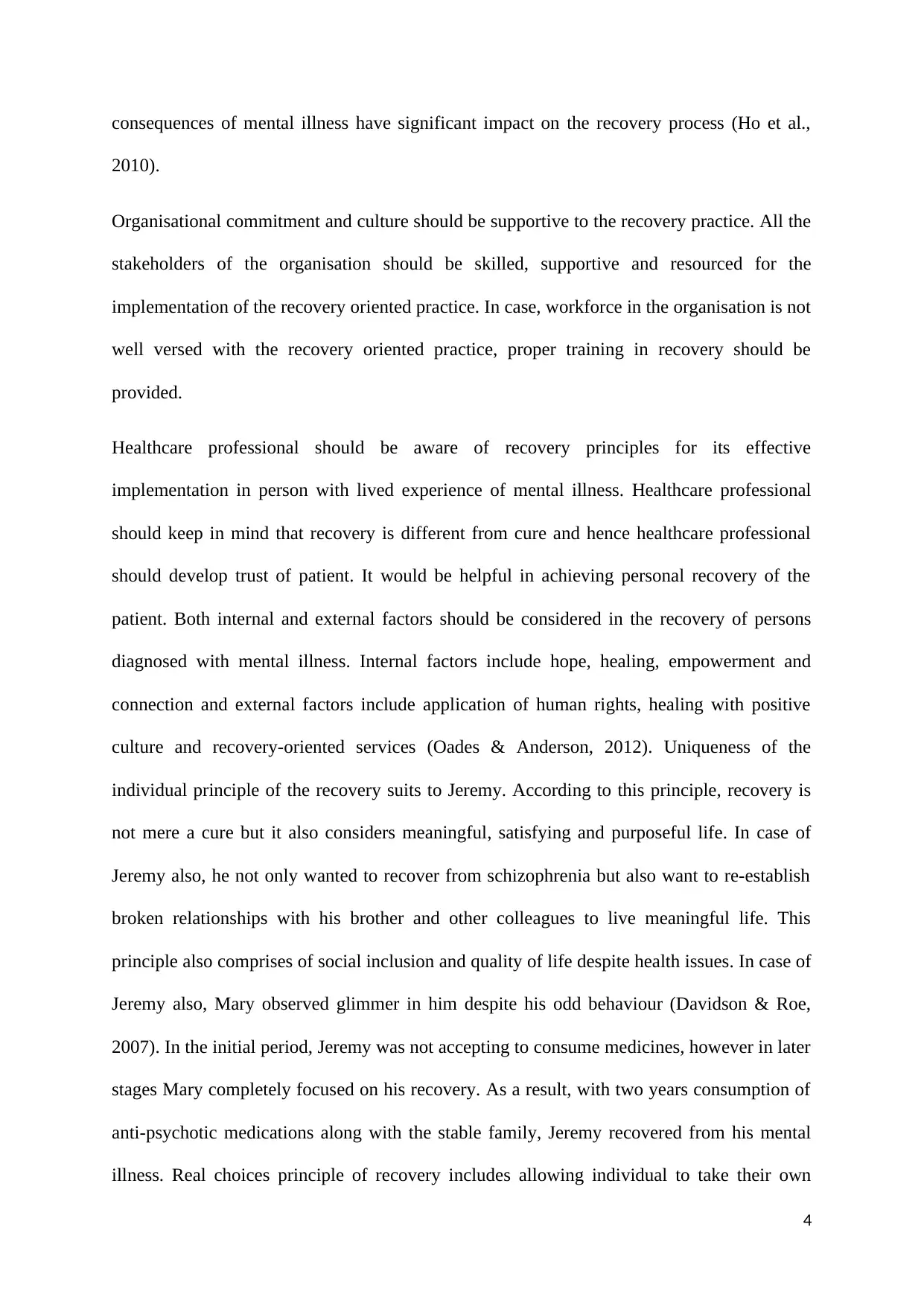
consequences of mental illness have significant impact on the recovery process (Ho et al.,
2010).
Organisational commitment and culture should be supportive to the recovery practice. All the
stakeholders of the organisation should be skilled, supportive and resourced for the
implementation of the recovery oriented practice. In case, workforce in the organisation is not
well versed with the recovery oriented practice, proper training in recovery should be
provided.
Healthcare professional should be aware of recovery principles for its effective
implementation in person with lived experience of mental illness. Healthcare professional
should keep in mind that recovery is different from cure and hence healthcare professional
should develop trust of patient. It would be helpful in achieving personal recovery of the
patient. Both internal and external factors should be considered in the recovery of persons
diagnosed with mental illness. Internal factors include hope, healing, empowerment and
connection and external factors include application of human rights, healing with positive
culture and recovery-oriented services (Oades & Anderson, 2012). Uniqueness of the
individual principle of the recovery suits to Jeremy. According to this principle, recovery is
not mere a cure but it also considers meaningful, satisfying and purposeful life. In case of
Jeremy also, he not only wanted to recover from schizophrenia but also want to re-establish
broken relationships with his brother and other colleagues to live meaningful life. This
principle also comprises of social inclusion and quality of life despite health issues. In case of
Jeremy also, Mary observed glimmer in him despite his odd behaviour (Davidson & Roe,
2007). In the initial period, Jeremy was not accepting to consume medicines, however in later
stages Mary completely focused on his recovery. As a result, with two years consumption of
anti-psychotic medications along with the stable family, Jeremy recovered from his mental
illness. Real choices principle of recovery includes allowing individual to take their own
4
2010).
Organisational commitment and culture should be supportive to the recovery practice. All the
stakeholders of the organisation should be skilled, supportive and resourced for the
implementation of the recovery oriented practice. In case, workforce in the organisation is not
well versed with the recovery oriented practice, proper training in recovery should be
provided.
Healthcare professional should be aware of recovery principles for its effective
implementation in person with lived experience of mental illness. Healthcare professional
should keep in mind that recovery is different from cure and hence healthcare professional
should develop trust of patient. It would be helpful in achieving personal recovery of the
patient. Both internal and external factors should be considered in the recovery of persons
diagnosed with mental illness. Internal factors include hope, healing, empowerment and
connection and external factors include application of human rights, healing with positive
culture and recovery-oriented services (Oades & Anderson, 2012). Uniqueness of the
individual principle of the recovery suits to Jeremy. According to this principle, recovery is
not mere a cure but it also considers meaningful, satisfying and purposeful life. In case of
Jeremy also, he not only wanted to recover from schizophrenia but also want to re-establish
broken relationships with his brother and other colleagues to live meaningful life. This
principle also comprises of social inclusion and quality of life despite health issues. In case of
Jeremy also, Mary observed glimmer in him despite his odd behaviour (Davidson & Roe,
2007). In the initial period, Jeremy was not accepting to consume medicines, however in later
stages Mary completely focused on his recovery. As a result, with two years consumption of
anti-psychotic medications along with the stable family, Jeremy recovered from his mental
illness. Real choices principle of recovery includes allowing individual to take their own
4
Paraphrase This Document
Need a fresh take? Get an instant paraphrase of this document with our AI Paraphraser
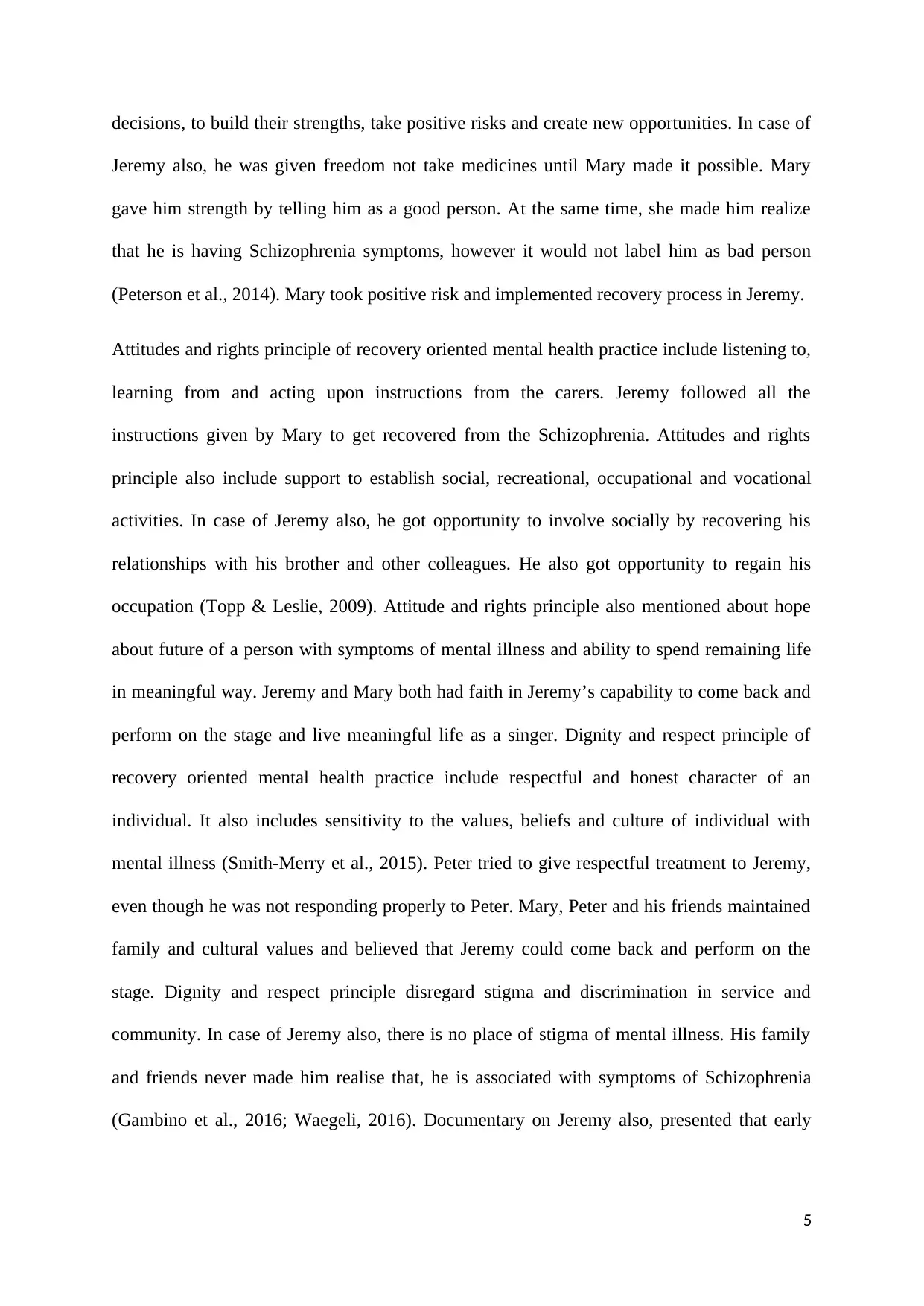
decisions, to build their strengths, take positive risks and create new opportunities. In case of
Jeremy also, he was given freedom not take medicines until Mary made it possible. Mary
gave him strength by telling him as a good person. At the same time, she made him realize
that he is having Schizophrenia symptoms, however it would not label him as bad person
(Peterson et al., 2014). Mary took positive risk and implemented recovery process in Jeremy.
Attitudes and rights principle of recovery oriented mental health practice include listening to,
learning from and acting upon instructions from the carers. Jeremy followed all the
instructions given by Mary to get recovered from the Schizophrenia. Attitudes and rights
principle also include support to establish social, recreational, occupational and vocational
activities. In case of Jeremy also, he got opportunity to involve socially by recovering his
relationships with his brother and other colleagues. He also got opportunity to regain his
occupation (Topp & Leslie, 2009). Attitude and rights principle also mentioned about hope
about future of a person with symptoms of mental illness and ability to spend remaining life
in meaningful way. Jeremy and Mary both had faith in Jeremy’s capability to come back and
perform on the stage and live meaningful life as a singer. Dignity and respect principle of
recovery oriented mental health practice include respectful and honest character of an
individual. It also includes sensitivity to the values, beliefs and culture of individual with
mental illness (Smith-Merry et al., 2015). Peter tried to give respectful treatment to Jeremy,
even though he was not responding properly to Peter. Mary, Peter and his friends maintained
family and cultural values and believed that Jeremy could come back and perform on the
stage. Dignity and respect principle disregard stigma and discrimination in service and
community. In case of Jeremy also, there is no place of stigma of mental illness. His family
and friends never made him realise that, he is associated with symptoms of Schizophrenia
(Gambino et al., 2016; Waegeli, 2016). Documentary on Jeremy also, presented that early
5
Jeremy also, he was given freedom not take medicines until Mary made it possible. Mary
gave him strength by telling him as a good person. At the same time, she made him realize
that he is having Schizophrenia symptoms, however it would not label him as bad person
(Peterson et al., 2014). Mary took positive risk and implemented recovery process in Jeremy.
Attitudes and rights principle of recovery oriented mental health practice include listening to,
learning from and acting upon instructions from the carers. Jeremy followed all the
instructions given by Mary to get recovered from the Schizophrenia. Attitudes and rights
principle also include support to establish social, recreational, occupational and vocational
activities. In case of Jeremy also, he got opportunity to involve socially by recovering his
relationships with his brother and other colleagues. He also got opportunity to regain his
occupation (Topp & Leslie, 2009). Attitude and rights principle also mentioned about hope
about future of a person with symptoms of mental illness and ability to spend remaining life
in meaningful way. Jeremy and Mary both had faith in Jeremy’s capability to come back and
perform on the stage and live meaningful life as a singer. Dignity and respect principle of
recovery oriented mental health practice include respectful and honest character of an
individual. It also includes sensitivity to the values, beliefs and culture of individual with
mental illness (Smith-Merry et al., 2015). Peter tried to give respectful treatment to Jeremy,
even though he was not responding properly to Peter. Mary, Peter and his friends maintained
family and cultural values and believed that Jeremy could come back and perform on the
stage. Dignity and respect principle disregard stigma and discrimination in service and
community. In case of Jeremy also, there is no place of stigma of mental illness. His family
and friends never made him realise that, he is associated with symptoms of Schizophrenia
(Gambino et al., 2016; Waegeli, 2016). Documentary on Jeremy also, presented that early
5
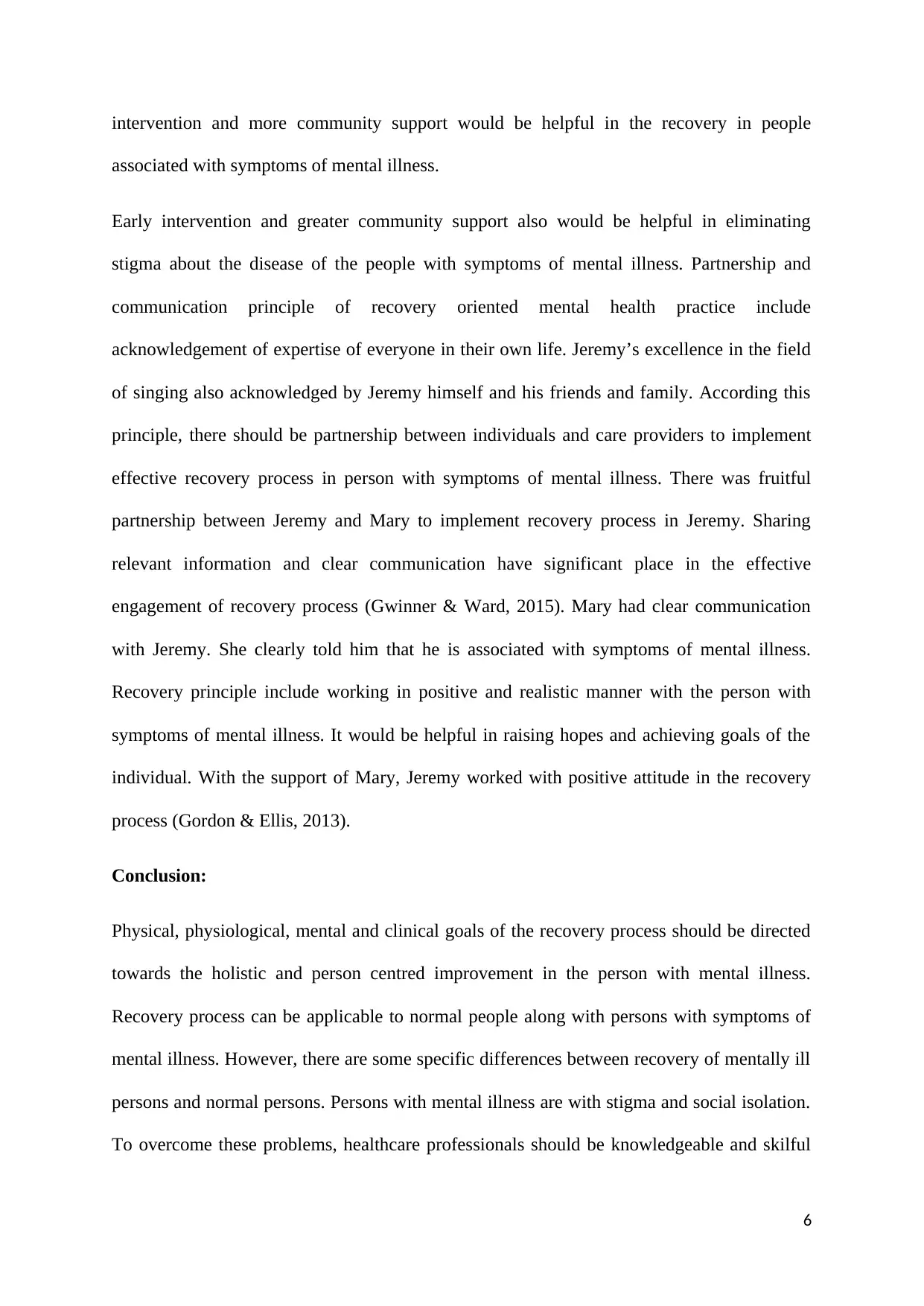
intervention and more community support would be helpful in the recovery in people
associated with symptoms of mental illness.
Early intervention and greater community support also would be helpful in eliminating
stigma about the disease of the people with symptoms of mental illness. Partnership and
communication principle of recovery oriented mental health practice include
acknowledgement of expertise of everyone in their own life. Jeremy’s excellence in the field
of singing also acknowledged by Jeremy himself and his friends and family. According this
principle, there should be partnership between individuals and care providers to implement
effective recovery process in person with symptoms of mental illness. There was fruitful
partnership between Jeremy and Mary to implement recovery process in Jeremy. Sharing
relevant information and clear communication have significant place in the effective
engagement of recovery process (Gwinner & Ward, 2015). Mary had clear communication
with Jeremy. She clearly told him that he is associated with symptoms of mental illness.
Recovery principle include working in positive and realistic manner with the person with
symptoms of mental illness. It would be helpful in raising hopes and achieving goals of the
individual. With the support of Mary, Jeremy worked with positive attitude in the recovery
process (Gordon & Ellis, 2013).
Conclusion:
Physical, physiological, mental and clinical goals of the recovery process should be directed
towards the holistic and person centred improvement in the person with mental illness.
Recovery process can be applicable to normal people along with persons with symptoms of
mental illness. However, there are some specific differences between recovery of mentally ill
persons and normal persons. Persons with mental illness are with stigma and social isolation.
To overcome these problems, healthcare professionals should be knowledgeable and skilful
6
associated with symptoms of mental illness.
Early intervention and greater community support also would be helpful in eliminating
stigma about the disease of the people with symptoms of mental illness. Partnership and
communication principle of recovery oriented mental health practice include
acknowledgement of expertise of everyone in their own life. Jeremy’s excellence in the field
of singing also acknowledged by Jeremy himself and his friends and family. According this
principle, there should be partnership between individuals and care providers to implement
effective recovery process in person with symptoms of mental illness. There was fruitful
partnership between Jeremy and Mary to implement recovery process in Jeremy. Sharing
relevant information and clear communication have significant place in the effective
engagement of recovery process (Gwinner & Ward, 2015). Mary had clear communication
with Jeremy. She clearly told him that he is associated with symptoms of mental illness.
Recovery principle include working in positive and realistic manner with the person with
symptoms of mental illness. It would be helpful in raising hopes and achieving goals of the
individual. With the support of Mary, Jeremy worked with positive attitude in the recovery
process (Gordon & Ellis, 2013).
Conclusion:
Physical, physiological, mental and clinical goals of the recovery process should be directed
towards the holistic and person centred improvement in the person with mental illness.
Recovery process can be applicable to normal people along with persons with symptoms of
mental illness. However, there are some specific differences between recovery of mentally ill
persons and normal persons. Persons with mental illness are with stigma and social isolation.
To overcome these problems, healthcare professionals should be knowledgeable and skilful
6
⊘ This is a preview!⊘
Do you want full access?
Subscribe today to unlock all pages.

Trusted by 1+ million students worldwide
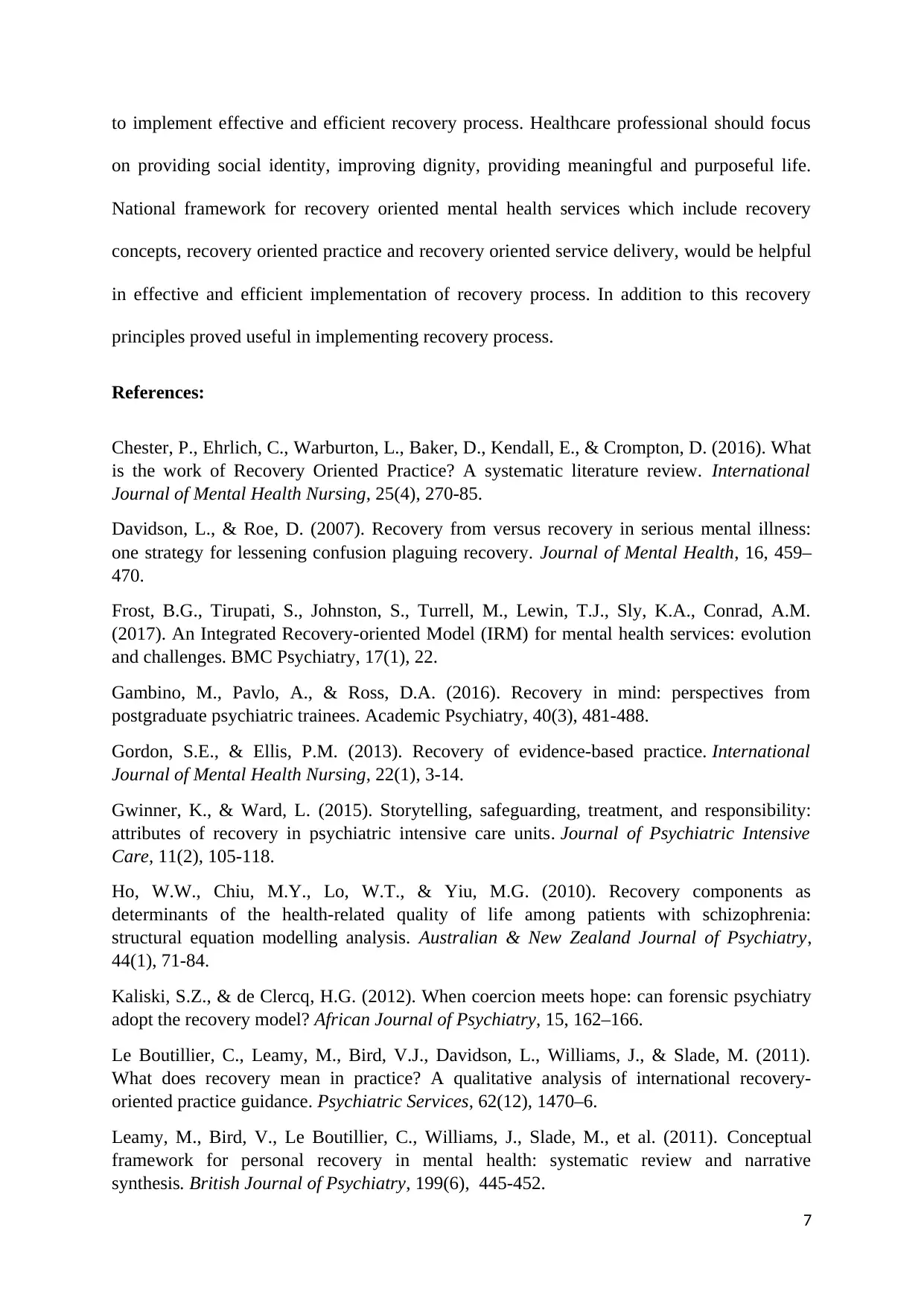
to implement effective and efficient recovery process. Healthcare professional should focus
on providing social identity, improving dignity, providing meaningful and purposeful life.
National framework for recovery oriented mental health services which include recovery
concepts, recovery oriented practice and recovery oriented service delivery, would be helpful
in effective and efficient implementation of recovery process. In addition to this recovery
principles proved useful in implementing recovery process.
References:
Chester, P., Ehrlich, C., Warburton, L., Baker, D., Kendall, E., & Crompton, D. (2016). What
is the work of Recovery Oriented Practice? A systematic literature review. International
Journal of Mental Health Nursing, 25(4), 270-85.
Davidson, L., & Roe, D. (2007). Recovery from versus recovery in serious mental illness:
one strategy for lessening confusion plaguing recovery. Journal of Mental Health, 16, 459–
470.
Frost, B.G., Tirupati, S., Johnston, S., Turrell, M., Lewin, T.J., Sly, K.A., Conrad, A.M.
(2017). An Integrated Recovery-oriented Model (IRM) for mental health services: evolution
and challenges. BMC Psychiatry, 17(1), 22.
Gambino, M., Pavlo, A., & Ross, D.A. (2016). Recovery in mind: perspectives from
postgraduate psychiatric trainees. Academic Psychiatry, 40(3), 481-488.
Gordon, S.E., & Ellis, P.M. (2013). Recovery of evidence-based practice. International
Journal of Mental Health Nursing, 22(1), 3-14.
Gwinner, K., & Ward, L. (2015). Storytelling, safeguarding, treatment, and responsibility:
attributes of recovery in psychiatric intensive care units. Journal of Psychiatric Intensive
Care, 11(2), 105-118.
Ho, W.W., Chiu, M.Y., Lo, W.T., & Yiu, M.G. (2010). Recovery components as
determinants of the health-related quality of life among patients with schizophrenia:
structural equation modelling analysis. Australian & New Zealand Journal of Psychiatry,
44(1), 71-84.
Kaliski, S.Z., & de Clercq, H.G. (2012). When coercion meets hope: can forensic psychiatry
adopt the recovery model? African Journal of Psychiatry, 15, 162–166.
Le Boutillier, C., Leamy, M., Bird, V.J., Davidson, L., Williams, J., & Slade, M. (2011).
What does recovery mean in practice? A qualitative analysis of international recovery-
oriented practice guidance. Psychiatric Services, 62(12), 1470–6.
Leamy, M., Bird, V., Le Boutillier, C., Williams, J., Slade, M., et al. (2011). Conceptual
framework for personal recovery in mental health: systematic review and narrative
synthesis. British Journal of Psychiatry, 199(6), 445-452.
7
on providing social identity, improving dignity, providing meaningful and purposeful life.
National framework for recovery oriented mental health services which include recovery
concepts, recovery oriented practice and recovery oriented service delivery, would be helpful
in effective and efficient implementation of recovery process. In addition to this recovery
principles proved useful in implementing recovery process.
References:
Chester, P., Ehrlich, C., Warburton, L., Baker, D., Kendall, E., & Crompton, D. (2016). What
is the work of Recovery Oriented Practice? A systematic literature review. International
Journal of Mental Health Nursing, 25(4), 270-85.
Davidson, L., & Roe, D. (2007). Recovery from versus recovery in serious mental illness:
one strategy for lessening confusion plaguing recovery. Journal of Mental Health, 16, 459–
470.
Frost, B.G., Tirupati, S., Johnston, S., Turrell, M., Lewin, T.J., Sly, K.A., Conrad, A.M.
(2017). An Integrated Recovery-oriented Model (IRM) for mental health services: evolution
and challenges. BMC Psychiatry, 17(1), 22.
Gambino, M., Pavlo, A., & Ross, D.A. (2016). Recovery in mind: perspectives from
postgraduate psychiatric trainees. Academic Psychiatry, 40(3), 481-488.
Gordon, S.E., & Ellis, P.M. (2013). Recovery of evidence-based practice. International
Journal of Mental Health Nursing, 22(1), 3-14.
Gwinner, K., & Ward, L. (2015). Storytelling, safeguarding, treatment, and responsibility:
attributes of recovery in psychiatric intensive care units. Journal of Psychiatric Intensive
Care, 11(2), 105-118.
Ho, W.W., Chiu, M.Y., Lo, W.T., & Yiu, M.G. (2010). Recovery components as
determinants of the health-related quality of life among patients with schizophrenia:
structural equation modelling analysis. Australian & New Zealand Journal of Psychiatry,
44(1), 71-84.
Kaliski, S.Z., & de Clercq, H.G. (2012). When coercion meets hope: can forensic psychiatry
adopt the recovery model? African Journal of Psychiatry, 15, 162–166.
Le Boutillier, C., Leamy, M., Bird, V.J., Davidson, L., Williams, J., & Slade, M. (2011).
What does recovery mean in practice? A qualitative analysis of international recovery-
oriented practice guidance. Psychiatric Services, 62(12), 1470–6.
Leamy, M., Bird, V., Le Boutillier, C., Williams, J., Slade, M., et al. (2011). Conceptual
framework for personal recovery in mental health: systematic review and narrative
synthesis. British Journal of Psychiatry, 199(6), 445-452.
7
Paraphrase This Document
Need a fresh take? Get an instant paraphrase of this document with our AI Paraphraser
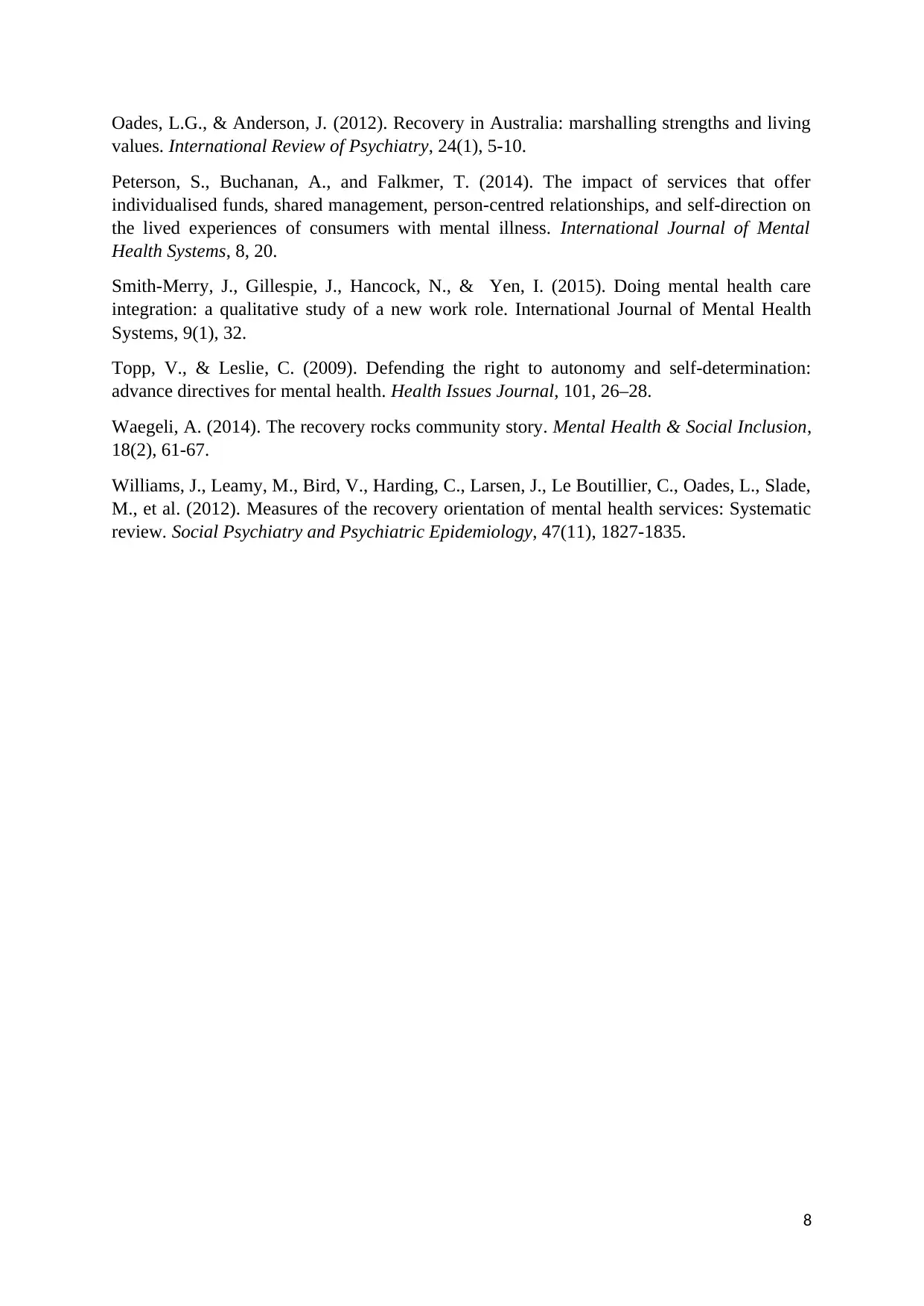
Oades, L.G., & Anderson, J. (2012). Recovery in Australia: marshalling strengths and living
values. International Review of Psychiatry, 24(1), 5-10.
Peterson, S., Buchanan, A., and Falkmer, T. (2014). The impact of services that offer
individualised funds, shared management, person-centred relationships, and self-direction on
the lived experiences of consumers with mental illness. International Journal of Mental
Health Systems, 8, 20.
Smith-Merry, J., Gillespie, J., Hancock, N., & Yen, I. (2015). Doing mental health care
integration: a qualitative study of a new work role. International Journal of Mental Health
Systems, 9(1), 32.
Topp, V., & Leslie, C. (2009). Defending the right to autonomy and self-determination:
advance directives for mental health. Health Issues Journal, 101, 26–28.
Waegeli, A. (2014). The recovery rocks community story. Mental Health & Social Inclusion,
18(2), 61-67.
Williams, J., Leamy, M., Bird, V., Harding, C., Larsen, J., Le Boutillier, C., Oades, L., Slade,
M., et al. (2012). Measures of the recovery orientation of mental health services: Systematic
review. Social Psychiatry and Psychiatric Epidemiology, 47(11), 1827-1835.
8
values. International Review of Psychiatry, 24(1), 5-10.
Peterson, S., Buchanan, A., and Falkmer, T. (2014). The impact of services that offer
individualised funds, shared management, person-centred relationships, and self-direction on
the lived experiences of consumers with mental illness. International Journal of Mental
Health Systems, 8, 20.
Smith-Merry, J., Gillespie, J., Hancock, N., & Yen, I. (2015). Doing mental health care
integration: a qualitative study of a new work role. International Journal of Mental Health
Systems, 9(1), 32.
Topp, V., & Leslie, C. (2009). Defending the right to autonomy and self-determination:
advance directives for mental health. Health Issues Journal, 101, 26–28.
Waegeli, A. (2014). The recovery rocks community story. Mental Health & Social Inclusion,
18(2), 61-67.
Williams, J., Leamy, M., Bird, V., Harding, C., Larsen, J., Le Boutillier, C., Oades, L., Slade,
M., et al. (2012). Measures of the recovery orientation of mental health services: Systematic
review. Social Psychiatry and Psychiatric Epidemiology, 47(11), 1827-1835.
8
1 out of 8
Related Documents
Your All-in-One AI-Powered Toolkit for Academic Success.
+13062052269
info@desklib.com
Available 24*7 on WhatsApp / Email
![[object Object]](/_next/static/media/star-bottom.7253800d.svg)
Unlock your academic potential
Copyright © 2020–2025 A2Z Services. All Rights Reserved. Developed and managed by ZUCOL.





